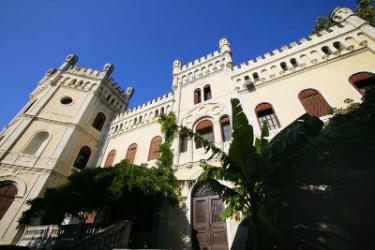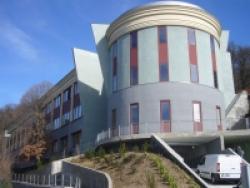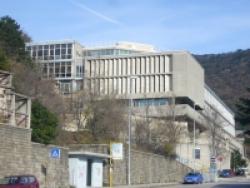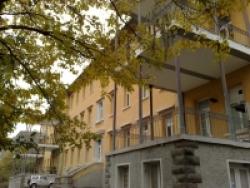- Home
- Department
- Research
- Teaching
- Post Graduate Studies
- Services and Equipment
- Knowledge Transfer
Department
The Department of Life Sciences
 The Department of Life Sciences (DSV) has been established in 2008 by the merging of four preexisting Departments: Biochemistry, Biophysics and Macromolecular Chemistry, Biology, Physiology and Pathology, and Biomedical Sciences. This nucleus has been joined in 2012 by the Department of Psychology.
The Department of Life Sciences (DSV) has been established in 2008 by the merging of four preexisting Departments: Biochemistry, Biophysics and Macromolecular Chemistry, Biology, Physiology and Pathology, and Biomedical Sciences. This nucleus has been joined in 2012 by the Department of Psychology.
The Department of Life Sciences spans all research, dissemination and teaching activities related to the broad fields of life sciences, psychology and cognitive sciences. These activities were originally included within the Faculty of Mathematical, Physical and Natural Sciences, founded in 1960 (with the undergraduate course in Natural Sciences, followed three years later by the course in Biological Sciences), and the younger Faculty of Psychology, established in 1997 as the legacy of the School of Experimental Psychology of Gaetano Kanisza.
All research activities and academic programs are presently (2022) carried out by a faculty of 89 academics made up by 15 full professors, 39 associate professors and 35 assistant professors. The research and teaching activities conducted span levels of complexity ranging from molecules, to cells and tissues of organisms, to their interaction with the environment, to the study of the brain/mind interactions.
The areas of interests and direct actions are Biomedicine, Environmental Biology, and Psychology. In these fields, the Department of Life Sciences hosts excellent scientists internationally recognized for their activities in basic and applied research.
Teaching activities
The 1st and 2nd level academic programs of the DSV are also organized in three educational paths, related to the three different areas of Biomedicine, Environmental Biology and Psychology.
The biomolecular-biomedical area relies on a Bachelor's degree in Biological sciences and technologies that provides a solid theoretical background in the different fields of life sciences, together with a training in technological and applied studies of biological systems at cellular and molecular level. The Bachelor gives access to three Master's degrees that develop specific and cutting-edge topics, with the involvement of high-profile teachers. The Master's degree in Functional genomics is based on the teaching of technologies and applications in the field of genomics, transcriptomics and proteomics, and is characterized by the presence of an international course in English which allows to achieve the double diploma issued jointly with the Universities Paris Diderot – Paris 7 and Paris - Descartes - Paris 5.
Entirely in English is the International Master's Degree in Neuroscience, that is unique in Italy and whose teaching staff includes experts in the field of neurobiology from ISAS/SISSA. Finally, the Master's degree in Medical Biotechnology provides a strong educational training in applied biology ranging from molecular medicine to nano – biotechnology.
The area of environmental biology relies on a Bachelor's degree in Science and Technology for Environment and Nature, that is managed jointly with two other UniTS Departments. It has a strong interdisciplinary feature: starting from a strong basic training, it provides the necessary knowledge of the ecosystems in their biotic and abiotic components up to modern techniques of environmental analysis. Among others, this degree allows access to the Master's degree in Global Change Ecology and Sustainability, that trains experts in the field of analysis, biomonitoring and management of terrestrial and marine environments, and to the Master's degree in Marine and Coastal Environmental Science, activated starting from the academic year 2022/23, that trains students to become experts in marine sciences, taking advantage of synergies with the UniTS Departments of Mathematics and Geosciences (DMG), Chemical and Pharmaceutical Sciences (DSCF) and Engineering and Architecture (DIA), and the National Institute of Oceanography and Applied Geophysics – OGS.
The area of Psychology provides students with a full educational training for a professional life as psychologists, and has two different, albeit related aims: to improve its teaching activities by aligning them with the current scientific understanding of the mind-brain system, and to provide our students with the best academic background for a professional life as psychologists. The Department of Life Sciences offers a Bachelor’s degree in Psychological Sciences and Techniques, where courses are offered in two manners: namely in the conventional manner of face-to-face teaching and laboratories, and in a web-based manner for working students. The Department also offers a Master’s degree in Psychology. The department Faculty are also involved in two crucial educational steps in the career of practicing psychologists: the one-year practicum following the Master’s degree, which is organized according to modalities approved by the National Board of Psychologists, and the state examination for becoming an authorized professional psychologist.
In addition, the Department of Life Sciences is involved in the management of two “five years Master's degrees” in Pharmacy and Pharmaceutical Chemistry and Technology, that train students for the profession of pharmacist, but also for research in the industrial pharmaceutical field.
The attractiveness of all these academic programs is very good, according to the large number of national and International students.
Graduate studies
The Department also offers PhD and postgraduate schools in the three main areas of Biomedicine, Environmental Life Science and Psychology.
The PhD program in Molecular Biomedicine aims at training students in various aspect of basic research that are integrated with applied and translational aspects within the broad field of modern biomedicine.
The inter-university PhD program in Environmental Life Sciences, in collaboration with the University of Udine, aims at training students to the managing and implementation of national and EU guidelines regarding environmental analysis, as well as developing novel methodological approaches to the issues of environmental bio-monitoring.
The PhD program in Neurosciences and Cognitive sciences offers an inter-disciplinary approach to the study of the nervous system, the mind-brain system and cognitive processes, and their implications in clinical, ergonomic, and sportive applications.
The Specialisation Course in Neuropsychology aims at training students to become experts in the prevention, diagnosis, treatment and rehabilitation in the processes of typical and atypical cognitive development across the entire life span.
Research
Regarding the research activities conducted within the area of Biomedicine, these are mostly articulated in: biochemistry of metabolism, pharmacology, basic and translational molecular oncology, molecular microbiology, development of biomaterials for tissue engineering, neurodegenerative diseases and other pathologies, pharmacology and toxicology of natural compounds, pharmacogenomics, and molecular immunology. Research in this area spans from basic molecular cell biology, to translational aspects linked to the use of molecular biomarkers for personalized medicine, and development of novel therapies and diagnostic tools.
Research activities in the area of Environmental Biology are addressed at both basic and applied activities, and are focused on topics fundamental for the analysis and management of natural and anthropic habitats. In particular, research activities are focused on the basic understanding of interactions between living organisms and their environment, and at applying this knowledge to the analysis and modeling of the impact of environmental changes on ecosystems composition, stability and related ecological and economic issues.
Among the main research streams of the Environmental Biology unit, it is worth citing biomonitoring activities both in marine and terrestrial habitats, development and application of plant ecophysiology to the analysis of the impact of global change on forest ecosystems and ecology of urban areas and related mitigation techniques, functional genomics applied to Ecology and Taxonomy comparative immunology applied to management strategies of invasive species, marine ecology studies spanning from trophic cycles to fisheries management, analysis of biodiversity from molecular to ecosystem levels, and finally biodiversity informatics, addressed at developing digital systems for species identification mainly devoted to citizen science activities.
The research activity in the area of Psychology is focused on the analysis of cognitive processes (perception, thinking, decision making, learning, attention and language), of their (typical and atypical) development, of their neural correlates, and of the inter-personal processes that govern human social behaviors. These lines of research take advantage of mixed tools and methodologies (observations, experiments, and qualitative and quantitative analyses). The research activities of the faculty in the Psychology area, as well as the students working on their Theses, rely on laboratories with facilities for the study of cognitive processes and motor skills, the registration of evoked potentials, and the observation of infant behavior. Research activities, especially those within the psychosocial field, benefit from the collaboration with various local and national organizations and institutions.
Technology transfer and "third mission"
The department of life sciences carries out several activities within the so called “third mission”, with important and widespread actions of social impact, such as: i) activities for students and teachers of the secondary schools, as well as their teachers, of local and international institutes; ii) activities to promote awareness and consciousness towards relevant scientific and social issues; iii) activities of health education and prevention; iv) activities of clinical diagnostics; v) activities of environmental biomonitoring and ecophysiology of biodiversity, with development and maintenance of databases and interactive tools in support of regional and national governmental agencies.
The Department of Life Sciences has also a significant activity in the area of technology transfer, being the structure with the highest number of patents applications of the University of Trieste.
Last update: 04-02-2024 - 16:42
Servizi online
ESSE3 - UGOV - ArTS - Moodle
Aule UniTS - Webmail - Cargo mail
Sito Docente (Cineca)
Help intranet:
registrazione.dsv@units.it
---











